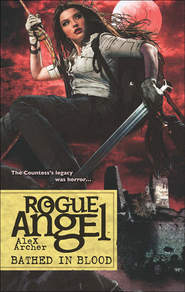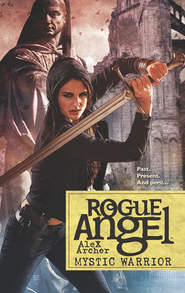По всем вопросам обращайтесь на: info@litportal.ru
(©) 2003-2025.
✖
Cradle Of Solitude
Автор
Год написания книги
2019
Настройки чтения
Размер шрифта
Высота строк
Поля
Bernard hit the switch on the lamp and it began humming slightly.
For a few minutes the sound was the only outward evidence that the device was even working. The light it emitted was not visible to the human eye, but eventually the foam began to bubble and break down. It reminded Annja of the head atop a soft drink after being dispensed from a soda fountain.
As the foam broke down, Bernard gently lowered the inclined backboard, inch by inch, until the skeleton rested flat on the examination table, the bones still arranged mostly in the same position in which they’d been discovered.
That’s pretty damn slick, Annja admitted to herself.
Bernard was obviously thinking the same thing, for he threw a huge grin in her direction. It was as if the foam had never existed.
Very carefully, they began separating the bones from the clothing. Each one was carefully measured and then photographed from multiple angles before being placed on another lab table for Bernard to examine more carefully. While he did that, Annja turned her attention to the clothing.
She started with the heavy jacket that had been worn over the uniform. Known as a regimental sack coat, it had a stand-up collar and six CSA buttons running down the front. It was made of wool and had held up pretty well in the cool atmosphere and low humidity of the catacombs. She had no doubt it had once been dyed gray, but the vegetable dye that was used in those days tended to break down quickly and the coat looked more brown than gray at this point.
The blood from the chest wound that had killed their subject had stained the inside of the coat and sealed the lip of the interior pocket closed. When she carefully pried it open, she discovered an envelope inside.
Annja felt her heart starting to beat faster.
Picking up a pair of rubber-tipped tweezers from the selection of tools on the table beside her, she gently inched the envelope out and placed it on a nearby light box where she could examine it in more detail.
“I’ve got something here, Bernard,” she said, and waited for her partner to join her before continuing.
They took multiple photographs to document the specimen. Then, with Bernard’s help, Annja carefully opened the envelope and withdrew the single sheet of paper it contained.
The paper was yellow and brittle with age. Worried that even the slightest pressure might cause an unwanted tear, Annja took her time, unfolding each section using the tweezers. When she had the page lying flat on the light board, she laid a piece of clear laminate over the top, much like the cover on a microscope slide. The laminate would allow her to view the paper clearly, without worrying about accidentally damaging the surface of the letter itself. She breathed a sigh of relief once it was in place.
With the protective cover in place, Annja clamped it down on each corner and then flipped the switch that activated the light board.
When illuminated from below, the ink appeared in sharp contrast to the faded surface of the paper, making it easier to see.
It was a letter.
Annja skimmed through the text, her eyes widening with each line. Upon reaching the signature she gasped in surprise. She heard Bernard whisper, “Mon Dieu,” mere seconds later.
The letter identified the bearer as Captain William Parker, Confederate Navy, and assured the recipient that not only did the captain have the letter writer’s complete confidence but that he was also empowered to act on his behalf with respect to an agreement involving mutual support and satisfaction.
The letter wasn’t addressed to anyone in particular and Annja puzzled over that for a moment until she realized that it had apparently been intended to be hand-delivered to its recipient. That was unfortunate, because knowing who the recipient was might have allowed them to trace things back in the other direction and gain some insight on what Parker, if that was indeed who it was, had been doing in the catacombs.
There was no doubt about where the letter had originated, however, for it had been signed in a thin, spidery script.
Jefferson Davis
President
Confederate States of America
Bernard broke the stunned silence first.
“What was a naval captain bearing a letter of introduction from the president of the Confederate States of America doing in the Paris catacombs?”
Annja shook her head. “I haven’t got a clue, but I promise you this—we’re going to find out!” she said excitedly.
She got up from the examination table and headed over to where she’d set up her laptop computer on a nearby desk. Firing up the web browser, she went to Google and typed Captain William Parker, Confederate Navy into the search bar.
The search produced more than a million hits.
The first one on the list was a short biography from the Naval Historical Center created by the U.S. Department of the Navy. She read parts of it aloud to Bernard, who was using a magnifying glass to examine the letter in more detail.
“Born in New York in 1826…graduated from the Naval Academy and served aboard the Yorktown off the coast of Africa…promoted to lieutenant in 1855.”
She jumped ahead a few lines, focusing in on his wartime service.
“Abandoned the North for the South in 1861 by joining the Confederate Navy. Commanded the gunboat Beaufort during the battle of Roanoke Island in 1862 and also saw action at Hampton Roads and Drewry’s Bluff that same year. In October of 1863 he was promoted to captain and took command of the Confederate Naval Academy, situated aboard the steamboat Patrick Henry in Richmond.”
So far, nothing really unusual, Annja thought. As commander of the Naval Academy, Parker might have had some interaction with the members of the president’s cabinet. But there was nothing that indicated he would have moved in the same social or political circles as the president himself.
Annja kept reading.
“After the war he served as captain of a Pacific mail steamship, was president of Maryland Agricultural College for a time, and even took a post as minister to Korea. He died in Washington in 1896.
“He’s best known for his role in guarding the Confederate treasury during the evacuation of Richmond following Lee’s defeat at Chancellorsville and rumors still persist about his involvement in the disappearance of the treasure.”
“What do you mean disappearance?” Bernard asked.
Annja was already typing Lost Confederate Treasure into Google. This time there were about three hundred thousand hits and she quickly skimmed through several articles to get a sense of the story.
“Apparently Captain Parker was given the difficult job of getting what was left of the Confederate treasury out of Richmond ahead of the invading Union troops. Like President Davis and his cabinet, the treasury made it out of the city aboard one of the last few trains headed for Danville. Once in Danville, the treasure was loaded onto a wagon train, which then set out under Parker’s command, headed for the old U.S. Mint in Charleston. Apparently it never made it. The treasury, all seven hundred thousand dollars of it, disappeared en route.”
Bernard frowned. “Treasure or no treasure, it would seem we’re no further along than we were before finding the letter because there’s no way that man—” he pointed over at the skeleton “—can be Captain Parker if what you’re saying is correct.”
Annja agreed. The letter must have been stolen or given to someone else, an aide perhaps, in order to prevent Parker from falling into just the kind of situation that had killed their subject.
Unless…
She stared at the floor, thinking it through.
When she didn’t say anything for a few minutes, Bernard gently shook her arm.
“What is it?” he asked.
She shrugged. “It’s nothing, really—a hunch, just a long shot….”
But Bernard knew that look and wouldn’t let her off without an explanation. “Out with it. What are you thinking?”
“All right. This is totally off the wall, I know,” she said, “but what if you’re wrong? What if that really is Captain Parker?”
Her colleague’s frown grew deeper. “But how is that possible? Given what you just read to me, I’d say he had a rather public face after the war.”
That was true, but something about the idea nagged at her and she wasn’t ready yet to let it go.











